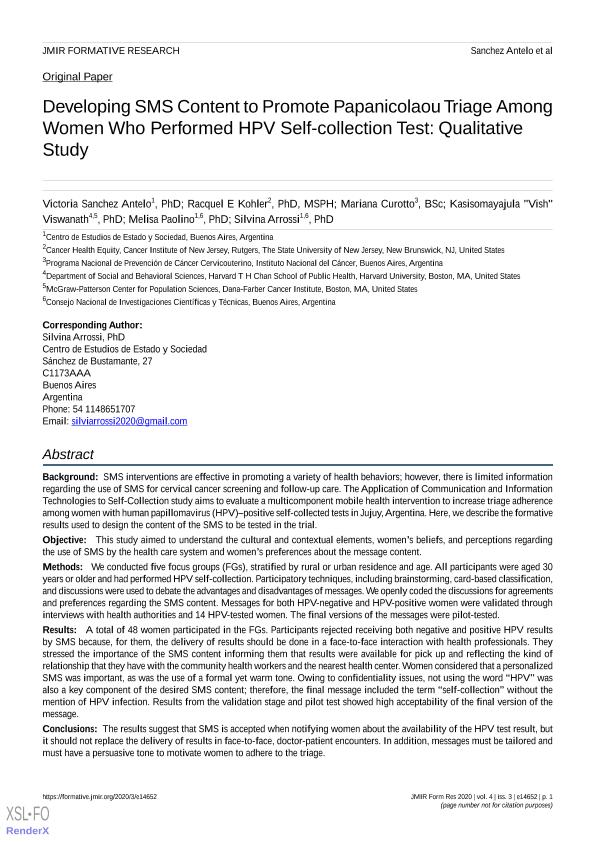Artículo
Developing SMS content to promote papanicolaou triage among women who performed HPV self-collection test: qualitative study
Sánchez Antelo, Victoria Inés María ; Kohler, Racquel; Ferraresi Curotto, Mariana; Viswanath, Kasisomayajula Vish; Paolino, Melisa Delia
; Kohler, Racquel; Ferraresi Curotto, Mariana; Viswanath, Kasisomayajula Vish; Paolino, Melisa Delia ; Arrossi, Silvina
; Arrossi, Silvina
 ; Kohler, Racquel; Ferraresi Curotto, Mariana; Viswanath, Kasisomayajula Vish; Paolino, Melisa Delia
; Kohler, Racquel; Ferraresi Curotto, Mariana; Viswanath, Kasisomayajula Vish; Paolino, Melisa Delia ; Arrossi, Silvina
; Arrossi, Silvina
Fecha de publicación:
03/2020
Editorial:
JMIR Publications Inc.
Revista:
JMIR Formative Research
ISSN:
2561-326X
e-ISSN:
2561-326X
Idioma:
Inglés
Tipo de recurso:
Artículo publicado
Clasificación temática:
Resumen
Background: SMS interventions are effective in promoting a variety of health behaviors; however, there is limited information regarding the use of SMS for cervical cancer screening and follow-up care. The Application of Communication and Information Technologies to Self-Collection study aims to evaluate a multicomponent mobile health intervention to increase triage adherence among women with human papillomavirus (HPV)–positive self-collected tests in Jujuy, Argentina. Here, we describe the formative results used to design the content of the SMS to be tested in the trial. Objective: This study aimed to understand the cultural and contextual elements, women’s beliefs, and perceptions regarding the use of SMS by the health care system and women’s preferences about the message content. Methods: We conducted five focus groups (FGs), stratified by rural or urban residence and age. All participants were aged 30 years or older and had performed HPV self-collection. Participatory techniques, including brainstorming, card-based classification, and discussions were used to debate the advantages and disadvantages of messages. We openly coded the discussions for agreements and preferences regarding the SMS content. Messages for both HPV-negative and HPV-positive women were validated through interviews with health authorities and 14 HPV-tested women. The final versions of the messages were pilot-tested. Results: A total of 48 women participated in the FGs. Participants rejected receiving both negative and positive HPV results by SMS because, for them, the delivery of results should be done in a face-to-face interaction with health professionals. They stressed the importance of the SMS content informing them that results were available for pick up and reflecting the kind of relationship that they have with the community health workers and the nearest health center. Women considered that a personalized SMS was important, as was the use of a formal yet warm tone. Owing to confidentiality issues, not using the word “HPV” was also a key component of the desired SMS content; therefore, the final message included the term “self-collection” without the mention of HPV infection. Results from the validation stage and pilot test showed high acceptability of the final version of the message. Conclusions: The results suggest that SMS is accepted when notifying women about the availability of the HPV test result, but it should not replace the delivery of results in face-to-face, doctor-patient encounters. In addition, messages must be tailored and must have a persuasive tone to motivate women to adhere to the triage.
Archivos asociados
Licencia
Identificadores
Colecciones
Articulos(SEDE CENTRAL)
Articulos de SEDE CENTRAL
Articulos de SEDE CENTRAL
Citación
Sánchez Antelo, Victoria Inés María; Kohler, Racquel; Ferraresi Curotto, Mariana; Viswanath, Kasisomayajula Vish; Paolino, Melisa Delia; et al.; Developing SMS content to promote papanicolaou triage among women who performed HPV self-collection test: qualitative study; JMIR Publications Inc.; JMIR Formative Research; 4; 3; 3-2020; 1-14
Compartir
Altmétricas



